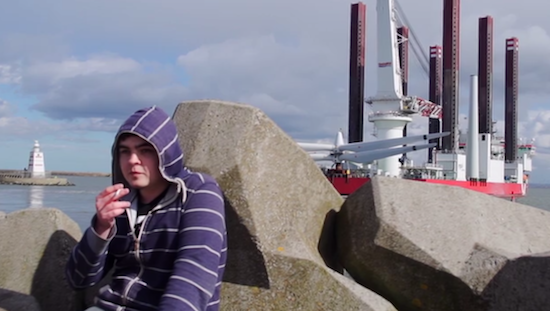The last time the Quietus met up with the author, film-maker and raconteur Michael Smith he was promoting his latest book, Unreal City, published by Faber, a beautifully crafted collection of vignettes that formed his “dysfunctional love letter to London”.
Smith’s latest project, Another England, has taken him away from the city and back to his home town of Hartlepool in North-East England for a four-film cycle made in collaboration with his old friend Maxy Bianco. As with all things Smith, it is a poetic and ruminative meditation on place and what it means to belong; especially the first film, Old Town (watch below), which follows the return of the prodigal son, Smith, to the town – a “daft, ramshackle paradise” as he reassesses his feelings for the place he couldn’t leave fast enough as a young man.
Smith and Bianco’s films are the antithesis of the current vogue on television to demonise and mock the working classes (through programmes such as Channel 4’s exploitative Skint, set on a housing estate in Scunthorpe), instead observing without judgement a place completely off the “cultural radar” and those who exist on the fringes of society, as the camera bears witness to how the old communities and ways of life are being destroyed. You’d have to have a heart of stone to not be moved by the scene where the old corner shop (once owned by Maxy’s family) is pulled down.
Smith, a regular contributor to The Culture Show, has exclusively penned the Quietus a few words on the film cycle; read them below, with the rest of the films following:
“Another England is a cycle of films about my home town in the North-East, a place stranded on the edges of English society. It is a meditation on this marginal, sometimes otherworldly place, and the characters that haunt it. All four films ask the same central question in different ways: what does it mean to belong to somewhere?
Old Town asks this through the eyes of a prodigal son returning; Granada through the prism of an old neighbourhood and a family history crumbling below the wrecking balls of an urban redevelopment scheme; Black Beach through the vanishing way of life of the “Tantobies” and their horses and carts scratching a living on a derelict, coal-covered beach, and finally, Blue Lagoon through the eyes of the misfits who have a romantic and even mystical connection to the wildlife and the haunting sense of place of the petrochemical estuary on the edges of the town.
"I made these films with Maxy Bianco, one of my oldest friends from back home, and I think for both of us, exploring the “ugly beauty” and unique spirit of our town, this place that is below the cultural radar and so often overlooked, but is in its own way so remarkable and so deeply resonant for both of us, was a very special thing…”


